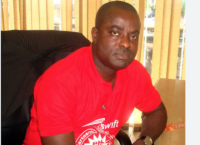
The 81 Division of the Nigerian Army said on Sunday that it would investigate allegations that some military officers were shielding drug peddlers in the Apapa-Iganmu Local Council Development Area of Lagos State.
This followed accusations by the chairman of the LCDA, Jimoh Saliu, who alleged that some top military officers were protecting illicit drug peddlers in the area.
In a statement on Sunday, Saliu claimed that a place known as Gidan Drama in the Marine Beach community of Apapa, which is not far from the Tego Army Barracks, served as a hub for illicit drug activities.
Describing the area as a hideout for notorious criminals, the LCDA chairman said various criminal activities were being perpetrated there, including the sale of illicit drugs and stolen goods.
Speaking at an event marking the 70th anniversary of the Corona Schools Trust Council at St Theresa Nursery and Primary School, Marine Beach, Saliu urged the state government and well-meaning organisations to acquire the area for the construction of a secondary school.
“The security situation in the LCDA is so bad and porous that even here in Marine Beach, there is a place called Gidan Drama, which is a nightmare to our existence.
“The whole area has been troubled by these bad boys, and I have been working with the police to track them down. If you go there now, you will find top military and police officers making it difficult to arrest drug peddlers and other criminal elements operating in the area.
“When they commit any criminal act, they run into the place, and when you get there, they are protected and arrest is prevented.
“With this situation, the future of our children is uncertain. We have many millionaires and billionaires in this community, yet none is investing in its future or development. If you go to Gidan Drama at night, you will see people bringing out bales of naira to buy all sorts of illicit drugs. If any local government official goes there, they are threatened or arrested.
“I recall that three staff members of the Apapa-Iganmu LCDA were arrested two weeks ago and taken to the Naval Dockyard. I had to contact the commander to explain that they were on an intelligence visit to Gidan Drama before they were released,” he said.
Saliu commended the Corona Schools Trust Council for its initiative in investing in the education and future of children.
When contacted over the allegations made by the council chairman, the spokesperson for the 81 Division of the Nigerian Army, Lt Col Musa Yahaya, said the chairman needed to be specific about which arm of the military he was referring to in order to aid investigations.
“When you say ‘military,’ you are referring to the Army, Navy, and Air Force. The military is a very large organisation.
“I speak for the 81 Division of the Nigerian Army. Issues like this require investigation before any response. I cannot speak on it for now, but I will make inquiries,” he told The PUNCH in a telephone interview on Sunday.
Speaking at the event, the Chief Executive Officer of the Corona Schools Trust Council, Adedoyin Adesina, said the organisation had remained committed to addressing the out-of-school children challenge over the years.
She disclosed that 75 children had been enrolled in schools in the Ago-Egan community of Bariga LCDA within three years, adding that the initiative would be replicated in Gangare, Apapa-Iganmu LCDA.

















Leave a comment